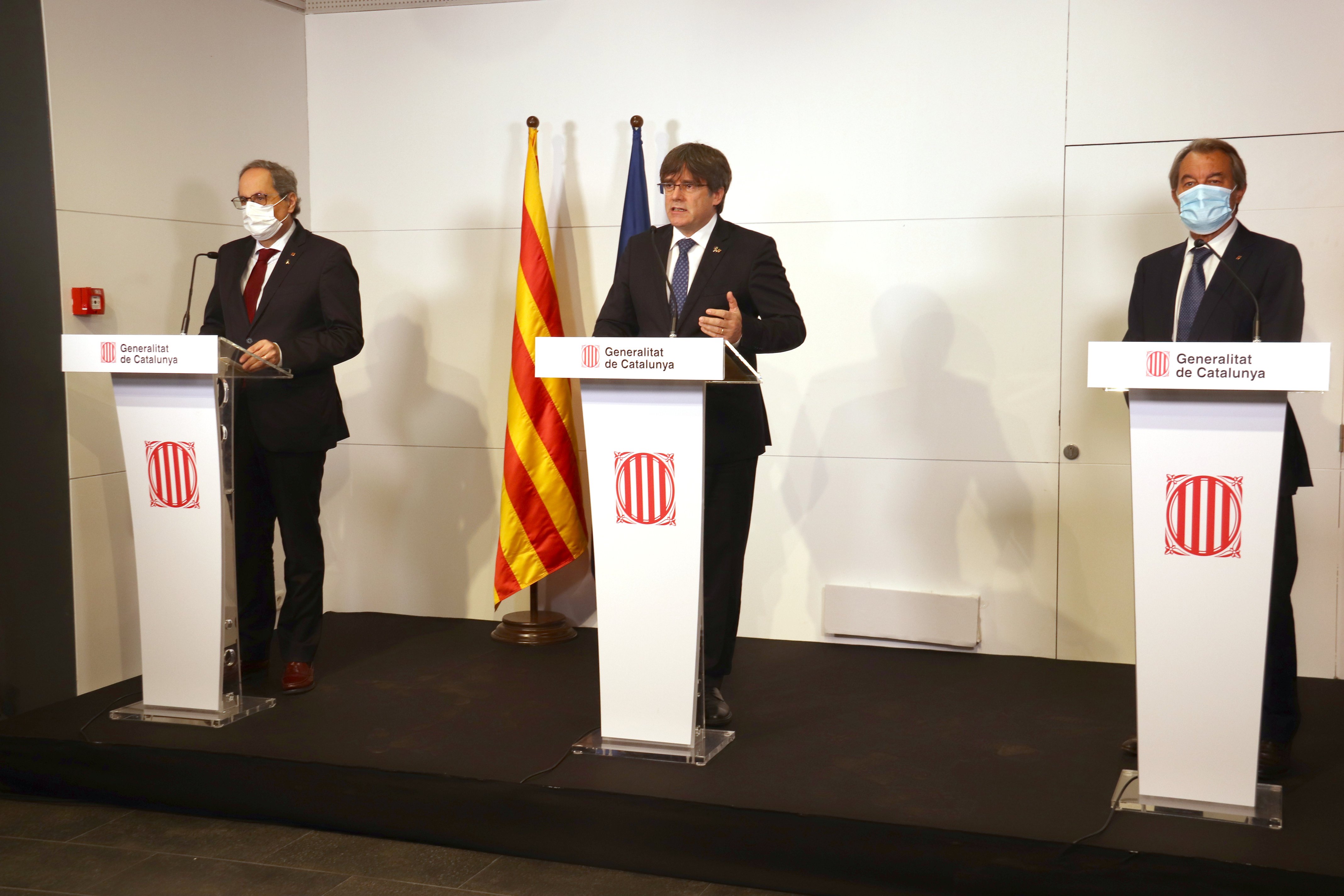The financial choking of former Catalan government leaders has been reactivated. Spain's controversial public auditing tribunal, the Court of Accounts, announced today that the deadline has now passed for submissions in the case against the governments of Artur Mas and Carles Puigdemont (case B-180/21), under which it seeks the reimbursement by decision makers of a sum of 5.4 million euros allegedly spent between 2011 and 2017 on promoting Catalonia and the independence process abroad. The tribunal details that "there are no new figures taking part", which means that the participants are the unionist group Societat Civil Catalana and Spanish public prosecutors on one side, and on the other, the thirty or so former Catalan political officials who are alleged to be responsible for the public spending. The Spanish state's solicitors, legal representatives of the Pedro Sánchez government, have already announced that they will withdraw at the trial stage, as it has been shown that there are no Spanish government funds in the cost items under suspicion. The Catalan government, which could take part in the trial directly if it decided to, has always maintained that "it was not harmed" by these expenses spent on promoting Catalonia.
The Court of Accounts states that the parties "entitled to sue" will now be given 20 days, and then another 20 days will be given to the public prosecutors to file their case. These are the steps prior to the actual court hearing. Last October, the then-investigator of the case, Margarita Mariscal de Ghent, ruled that there was evidence of accounting responsibility and demanded that the Catalan officials deposit the 5.4 million euro sum, definitively set on June 29th, 2021. Specifically, the new bill to the then-members of the Catalan government for the promotion of the independence process abroad is 5,422,879 euros (with 271,723 euros of interest already added). And, in the end, 34 public officials between 2011 and 2017 are alleged to be responsible for authorising these expenses.
The guarantees
Last October, the Republican Left (ERC) announced that it had deposited with the court two million euros of the sum that the Court of Accounts was claiming joint and severally as bail from the thirty former senior officials of the Generalitat of Catalonia. ERC sources detailed that the fundraising had been carried out with the efforts of party members and that, in particular, the two million euros covered all the former high-ranking officials who were in government between 2016 and 2017, namely, president Carles Puigdemont, vice president Oriol Junqueras and minister Raül Romeva, among others. Those in government earlier, during the Mas government, such as the former economy minister Andreu Mas-Colell, had to deposit personal real estate to cover the guarantee and avoid confiscation.
As for the spending, there are 31 cost items under suspicion, most of them relating to travel, but also contracts, rents, subsidies decided by the Diplocat office network or events at the sixteen Catalan government offices abroad. There is only one item that is attributed to a position, specifically, former secretary general of Diplocat, Albert Royo, to whom the most accounting responsibility (3.6 million) is attributed, along with the comptroller of the Catalan government Mireia Vidal (3.3 million). Specifically, Royo is only required to pay 84,465 euros for the staff of the public-private entity he headed and for the claim by two workers over the closure of the office in Lleida. Royo shares alleged responsibility with former minister Francesc Homs for 47,342 euros for analysis and dissemination contracts and for conferences on the "new economic paradigm in Catalonia". And for the subsidy of the Focir platform, created for Catalan civil society actors who take part in public diplomacy, a sum of 444,320 euros (also criminally investigated for other cost items), Homs is, according to the tribunal, jointly responsible with presidents Mas and Puigdemont, among other officials. With regard to the offices abroad, the delegation with the most spending which is under suspicion is that of the United Kingdom (308,515 euros), followed by the United States (176,374 euros) and Austria (144,047 euros).
The Catalan government devised a way of creating a fund to finance those affected, but this was ultimately rejected by the auditing tribunal itself. The Catalan High Court (TSJC) did not object, after far-right Vox appealed the fund's legality to that court. Specifically, in November 2021, the TSJC discarded an investigation of Catalan president Pere Aragonès, and ministers Jaume Giró and Laura Vilagrà for the financing system through the Catalan Institute of Finance (ICF) to assist the former senior government officials prosecuted by the Court of Accounts. In a ruling, the TSJC, in accordance with the criteria of the public prosecutors, dismissed the complaints laid by political parties Vox and Cs, and unionist civil group Convivència Cívica Catalana against the Pere Aragonés government for alleged misuse of funds in their financing plan to defend members of earlier governments who were subject to other allegations of misuse of funds.
Third procedure
The case centred on Catalan government foreign affairs spending is the third procedure that the Court of Accounts has undertaken against members of Catalonia's governments. The first was for the unofficial independence consultation on November 9th, 2014, for which a sum of 5.2 million euros was demanded from member of the Artur Mas government, which was finally raised through public donations to the Catalan Solidarity Fund. The second procedure by the tribunal was split-off by the Supreme Court from trial over the 1st October referendum and pertained to the accounting liability for organizing the 2017 vote, set at 4.2 million euros, imposed after the sedition convictions against members of the Catalan government. And in this third procedure, opened in autumn 2020, a 5.4 million euro sum is claimed. The Court of Accounts, an administrative body rather than a full court, underwent a long-overdue renewal of its membership in late 2020 - but this has not meant that the proceedings against the Catalan government have stopped.

